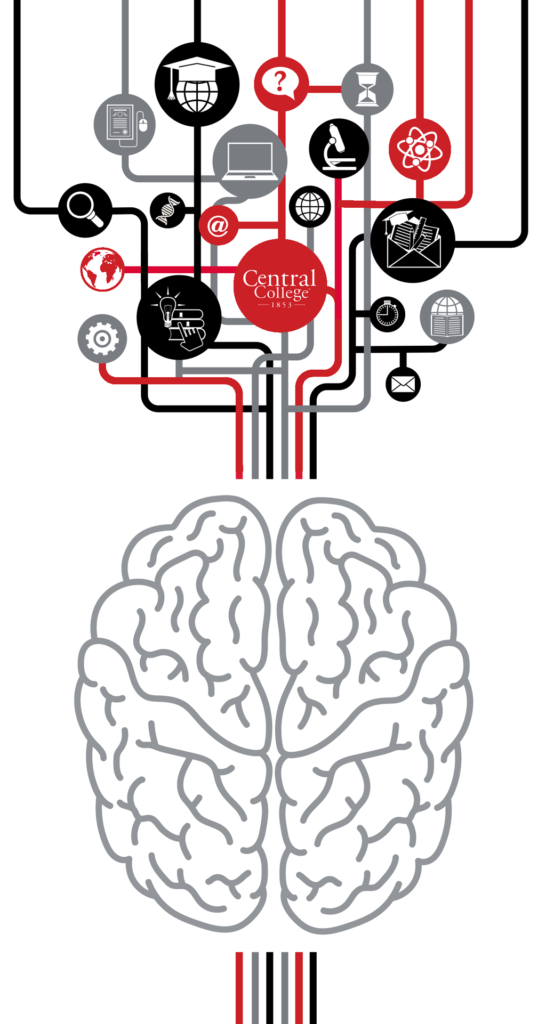 Joshua Cheek ’21 came to Central College anticipating the smaller class sizes would create opportunities to interact with faculty in more direct ways. Research was at the top of his list to accomplish exactly that.
Joshua Cheek ’21 came to Central College anticipating the smaller class sizes would create opportunities to interact with faculty in more direct ways. Research was at the top of his list to accomplish exactly that.
Cheek, a biochemistry major from Panama, Iowa, found research was in his DNA after his first research opportunity presented itself in the form of genetics research with Associate Professor of Biology Paulina Mena.
“A really good thing about Central is there are so many research opportunities,” Cheek says.
He’s not alone in thinking that. It’s no secret Central students find success during their time on campus and after graduation. Unique research options offered through coursework and individual outreach allow students to get a foot in opportunity’s door at Central and beyond.
Research in the Classroom
Students can engage in individual research under the guidance of faculty instructors as part of their course assignments.
In the psychology classroom, for example, research is an important part of the curriculum. Most students already are starting to learn psychological research methods by their sophomore year.
Before running an actual research study, students read and synthesize professional literature, generate research questions, develop hypotheses and curate a methodology to test those hypotheses.
By the fall semester of their junior year, students are equipped to do a deep dive into research. Working in groups they create, design, execute, analyze and report the results of their semester’s study.
“It’s a pretty daunting task,” says Keith Jones, the Mark and Kay De Cook Endowed Chair in Character and Leadership Development and professor of psychology.
It’s for that reason students first real experiences with research are done in a group.
“There’s a developmental step to get ready to do this work on their own for a course that’s coming up,” Jones says. “Also, it’s a great class to do together because they’re also learning collaborative problem-solving skills.”
Once students have collaborated and worked in a group, it’s time for individual research. Students are encouraged to choose a topic that interests them and design the study while a faculty member supervises and guides the project.
“The range of research our department does is really expansive, given the interest of our students and the way our curriculum is set up,” Jones says.
The real test of success: presenting at a conference. Each year Central offers students the chance to present research findings at the Celebration of Undergraduate Scholarship and Creative Inquiry. Traditionally, students in all disciplines were invited to present their research projects at the end of each semester. Now, the celebration will kick off as an annual day-long event at the end of each academic year as a way of underscoring the importance of collaborative undergraduate research with faculty as a high-impact experience for students.
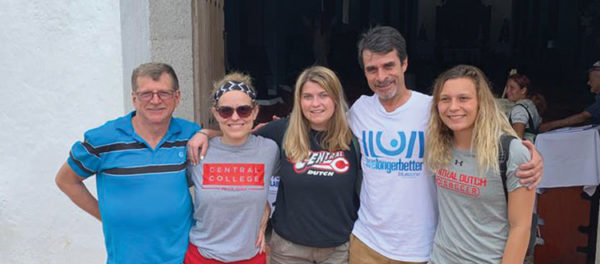
(L-R): Rogelio Barrantas Arias; Sara Shuger Fox, associate professor of exercise science; Cierra Rustad ’20; Jorge Vindas; and Sarah Casterline ’20. Shuger Fox, Rustad and Casterline traveled to Nicoya, Costa Rica, to study blue zones. There they met with Vindas, founder of the Blue Zone Association of Nicoya, and were led by Arias, a local guide. Photo supplied by Shuger Fox.
Seeking Research
Students also find research opportunities through word of mouth, faculty recommendations or simply reaching out to their advisor. These research opportunities are considered independent studies or undergraduate research modules.
Sara Shuger Fox, associate professor of exercise science, typically has students reach out to her for research opportunities.
“It’s really word of mouth by students, and finding out that I love nutrition,” Shuger Fox says.
Shuger Fox is known for the research projects she has led in Costa Rica, which sparks interest with students of multiple disciplines across campus.
“Students know I want to do something nutrition-based,” Shuger Fox says. “Most of the time they want to work on something that I’ve already been doing.”
All That and a Bunch of Research
Cheek is in the thick of his fifth and final semester of research in his undergrad career. His research has grown through a variety of STEM fields — his roots with biology sprouted into research with Professor of Chemistry James Shriver and blossomed into exercise science research with Shuger Fox. The transitions between scientific focuses were natural segues for Cheek’s innate curiosities. He was first introduced to Shuger Fox on a summer study abroad research trip to Costa Rica.
“I hadn’t taken any classes in the exercise science department at all,” Cheek says.
After spending that summer looking at markers of what could be warnings of diabetes and other health concerns, he was fascinated. And Shuger Fox noticed.
“I guess she must have liked the work that I was able to do with her in Costa Rica,” Cheek says. “She asked me to stay on and continue to do research with her.”
At its core, research at Central is about student exploration, growth and discovery.
“The range of research you can do will help hone your interests,” Cheek says. “It definitely helps anyone looking to go to grad school to get an idea of what research is like.”
Research at Central gave Cheek the ability to branch out beyond campus borders.
“I have a lot of interests at Central and in the Pella community,” Cheek says. “Research allowed me to pursue all of those.”
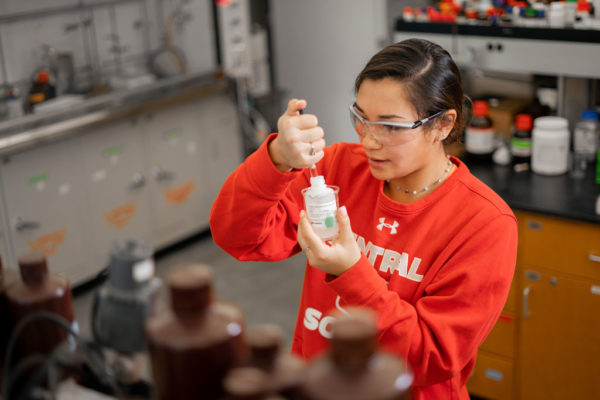
Katie Wang ’21 makes time to get in the research lab despite a heavy class load and full soccer schedule.
Hyper Personalized Experiences
Conversely, Katie Wang ’21, a biochemistry and Spanish double major from Minneapolis, Minnesota, chose a professor to do research with based off previous experience.
Wang was ready to start research her freshman year and, at the time, Shriver was the only science professor she knew from her classroom experience.
Research in the chemistry department differs from other areas. With a faculty-determined focus, students experience a more guided research experience. Students may collaborate on a larger scale project, but the components get broken down into smaller pieces students work on individually.
“Students take ownership of what they’re doing; they’re independent and get to make some decisions as they work through the project,” Shriver says. “In the end, they bring all the pieces together as needed.”
Much of this research is derived from work the guiding faculty member is working on. Essentially it is a continuation of a previously established project. Wang worked on the same research project — synthesizing indirubin — with Shriver the past two summers.
Wang acknowledges choosing Central allowed her to enjoy an early start to her research journey — something not a lot of other schools offer.
“Research projects take time,” Wang says. “It’s not a ‘one semester and done’ thing. So, if students can’t even start until late in their junior or senior year, there aren’t as many opportunities as there would be if they were able to start earlier.”
Wang isn’t alone in seeing the uniqueness of Central’s student research opportunities.
Fresh Intention
Bridget Lynch ’23, an engineering and mathematics double major from Northglenn, Colorado, got started on her first research project the summer after freshman year.
“Getting into my field of study introduced me to everything,” Lynch says. “Research at Central is just one more thing that gives students an edge up.”
Students’ field of study doesn’t necessarily matter when it comes to choosing a research area.
“If you find a passion or interest, reach out to these professors,” Shuger Fox says. “You don’t have to have them in class. You don’t have to have that relationship already.”
Summer Research
One-on-one research builds strong relationships between Central College students and faculty members. Lynch had the opportunity to make those connections through Central’s summer research program.
Lynch participated in summer research with Liz Golovatski, assistant professor of physics, focusing on computational physics. This ongoing research project of Golovatski’s has an overarching goal to improve the storage of information for computers without a moving hard drive. The research involves coding and connecting nanoscale magnets to control the flow of electrons, much like moving train cars on a track.
“Students learn how to code, and we play with some of the problems on the existing code,” Golovatski says. “That has the benefit of introducing students to a higher level of physics they might not have encountered before.”
An exceptional student, Golovatski’s research brought Lynch out of her comfort zone and taught her how to work independently.
“Some of the topics we talked about this summer were about things I hadn’t learned in classes yet, so I had no idea what was happening,” Lynch says. “Through research, I’ve learned how important it is to ask questions, which I hadn’t really had to do in classes.”
Lynch since has declared a double major in engineering and mathematics — the only female engineering student in the Class of 2023. Today, women make up just 28% of the workforce in science, technology, engineering and math (STEM).
“It’s nice knowing that I can go to Liz and have that female connection,” Lynch says. “Liz knows how hard it can be sometimes. She tries to be a resource for all of us and keeps us connected.”
Still, summer research doesn’t stop at computational physics. Projects span the liberal arts, including humanities, arts, natural sciences and social sciences. A 10-week summer experience typically attracts 10-25 students, whose research ranges from studying the genetic barcoding of bees and the role of public schools in addressing student anxiety to the geographic distribution of Iowa’s bat populations.
“Some of my biggest breakthroughs have been a result of summer research with students,” Golovatski says.
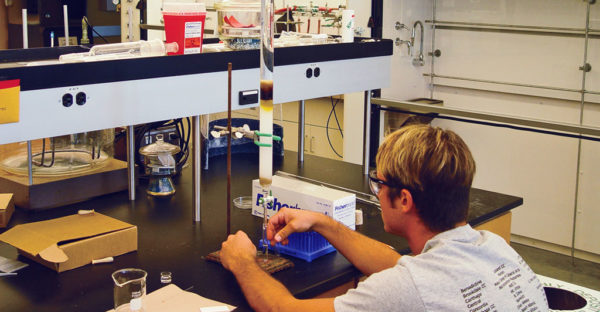
Daniel Flaherty ’05 spent time in the chemistry lab working on research with Central Professor of Chemistry James Shriver. Photo supplied by Flaherty.
Beyond Central
Research opens doors for students during their time at Central, and those experiences enable Central students to make the world their oyster after graduation.
Take Daniel Flaherty ’05, for example. He was once a chemistry major at Central. He moved on to graduate school at the University of Nebraska Medical Center in Omaha before tackling a post-doctorate at the University of Kansas in Lawrence. Now he’s an assistant professor of medicinal chemistry in molecular pharmacology at Purdue University in West Lafayette, Indiana.
“I run a research lab and teach undergraduate organic chemistry,” Flaherty says. “I spend about 75% of my time running a lab consisting of undergraduate and graduate researchers as well as post docs and 25% of my time teaching.”
Central — and chemistry research with Shriver — had a huge impact on Flaherty and the trajectory of his future.
“I came into Central as a lot of domestic students coming into undergrad do — ready to go and pursue a professional school degree,” Flaherty says. “Shriver’s lab was the first time I had real, directed, guided research and an introduction to something other than professional school.”
Flaherty’s undergrad research experiences and current leadership experience give him the authority to distinguish the difference in research at Central from other schools. His take? Mentorship and accessibility to faculty.
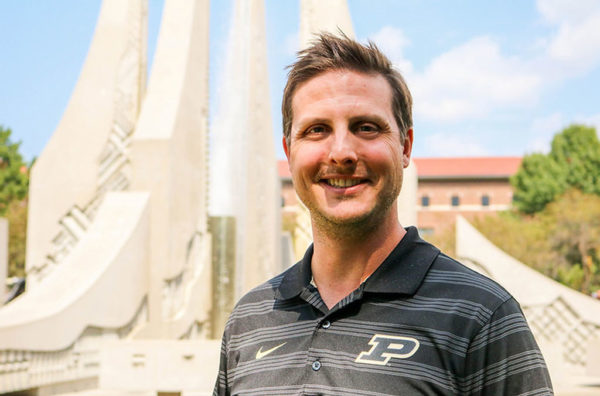
Daniel Flaherty ’05 now spends his time running a research lab at Purdue University and teaching undergraduate organic chemistry. Photo supplied by Flaherty.
“Having close contact to a mentor to help you along the way makes research successful,” Flaherty says. “That was obviously a big benefit of a small liberal arts college — you have close contact to mentors.”
Research reflects life in its ability to be unrestricted by how growth occurs. Failure is a part of life — and research — and is often a form of success. Failure also makes projected success that much sweeter.
“Ninety percent of your great research ideas are going to fail,” Flaherty says. “It’s the 10% that makes it really worthwhile.”
However, it’s not just about the research itself; it’s about the created opportunities through hands-on research that set Central students apart when applying to graduate schools. Flaherty knows. He sits on the graduate school admissions committee for his department at Purdue.
“A student can have a 4.0, but if they don’t have good research experience, they’re not at the top of the list for admissions,” Flaherty says.
Where Are They Going?
Joshua Cheek ’21
Hometown: Panama, Iowa
Major: Biochemistry
Scholarships: Presidential, Trustee, Journey
Career Goal: Physician with an interest in neurology and pediatrics
“Collecting information and learning things the right way has made my research successful at Central. Learning how to do research is going to be one of my biggest takeaways as I go into my future in healthcare and medical work.”
— Joshua Cheek ’21
Katie Wang ’21
Hometown: Minneapolis, Minnesota
Major: Biochemistry and Spanish
Scholarships: M. Joan Kuyper Farver
Career Goal: Enter an M.D./Ph.D. program and become a clinical researcher at an academic medical center
“Once I started doing research, it was like a switch flipped. It taught me how to do things and how you can apply it to other things. I think it gives a real-world perspective.”
— Katie Wang ’21
Where Are They Now?
Daniel Flaherty ’05
Location: West Lafayette, Indiana
Major: Chemistry
Scholarships: Distinguished, Van Doornick, VerDught, Central Heritage Grant
Occupation: Assistant Professor of Medicinal Chemistry and Molecular Pharmacology, Purdue University
“Successful research, especially in an undergraduate program, is having close contact to a mentor to help guide you along the way. Those relationships are important not just for research, but for facilitating further opportunities after graduation.”
— Daniel Flaherty ’05
Andrea Arthofer ’17
Location: Iowa City, Iowa
Majors: Pre-Medicine, Health and Exercise Science
Scholarships: Pella Rolscreen, C.V. Starr Foundation, Central Spanish Award
Occupation: Medical Student, University of Iowa Roy H. and Lucille A. Carver College of Medicine
“My research opportunities at Central made me realize I am more motivated to continue my education when I’m with other people that are as equally excited as I am about a subject.”
— Andrea Arthofer ’17
Making Research Possible
Funding for one-on-one research is key to opening new doors for students at Central. Funding provides necessary resources for students and their faculty mentors to make new discoveries, find solutions to complex problems and present research to a broader audience.
“Financing research during a regular course or as part of the larger curriculum will typically come from individual departmental budgets or from the office of academic affairs,” says Brian Peterson, associate dean for curriculum and faculty development at Central. “While more extended opportunities are funded by other sources.”
Case in point: Students can apply for a Bette Brunsting ’56 Student Project Fund grant to present their work at conferences, and faculty members can apply for a Faculty Research and Development Grant to present research with students.
Andrea Arthofer ’17 experienced firsthand how beneficial conference presentations are for her future in medicine. During her time at Central, Arthofer had the opportunity to present a Vitamin D research project in Abu Dhabi, United Arab Emirates, with Shuger Fox.
“Working with Dr. Shuger Fox, I learned how to write an abstract and submit that in the style that people prefer for conferences,” Arthofer says. “It’s a good skill to have because you need to submit an abstract before you can even be accepted to go to a conference. I also felt more comfortable having seen conferences work before and taking note of what presentation styles are well-received by an audience.”
Summer student/faculty research collaborations receive the most funding annually, as students receive a stipend and summer campus housing to accomplish the work they do. Summer research is made possible through funding from the Moore Family Foundation Faculty Development Program for Teaching; the Arthur J. Bosch Endowment for Student Research; and the Office of Academic Affairs.
Additional monetary contributions from generous donors make research opportunities a reality for many Central students. For the 2020-21 academic year, the Moore Family Foundation Faculty Development Program for Teaching funded 14 faculty projects, totaling more than $76,000. Since 1998, 62 donors have contributed to the Arthur J. Bosch Endowment for Student Research fund. To date, donors have contributed $160,230 to the fund.
Donors have contributed more than $1.43 million toward research in the past five years alone.
“We have so many generous donors,” says Sunny Gonzalez Eighmy ’99, Central’s vice president for advancement. “For those who like to provide an experience for our students, it doesn’t get better than pairing students and our talented faculty together to conduct research.”
Faculty can apply for funding through a new grant source to engage in research at domestic or international locations. Tej ’91 and Karen Spencer Dhawan ’91 established the Franks-Mahmood Fund for Undergraduate Research in April 2019.
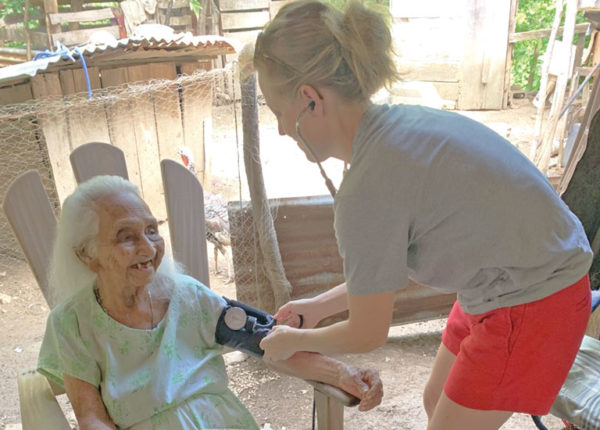
Sara Shuger Fox, associate professor of exercise science, researching centenarians and their health in Nicoya, Costa Rica. Photo supplied by Shuger Fox.
Cheek and Shuger Fox were the first to be awarded the new grant in 2020 with the goal to conduct research in Okinawa, Japan. However, the global pandemic continues to put a halt on international travel. Through past research opportunities, Cheek has learned the valuable skill of writing grants for projects, an important step in obtaining necessary funding.
“There’s a lot of research and work that goes into applying for funding,” Cheek says. “I know there’s plenty of good research being done by people at Central, so I’m sure it’s competitive. It’s so beneficial to know the research we’re doing is important to other people and they can see the benefits of bringing this information to the world.”
Learning to write grants is a practical way for students to benefit from research at Central.
“Grant writing is something I didn’t get when I was going through undergrad, and I wished I could have,” Shuger Fox says. “I did not realize then how vital that skill would be for my future work.”
Opportunities to build relationships, learn, grow, test, try and open new ways of thinking are provided to both students and faculty through donor support of undergraduate research.
“It’s so impactful and increasingly popular, it sometimes feels as though we could never raise enough to fund all of the incredible research ideas,” Eighmy says.
Inspired to support student research? Make a donation at central.edu/give. Interested donors also can call the Central College Advancement Office or mail contributions to Central College, Office of College Advancement, Campus Box 5200, 812 University St., Pella, IA, 50219.











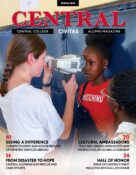
To encourage serious, intellectual discourse on Civitas, please include your first and last name when commenting. Anonymous comments will be removed.
Comments are closed.